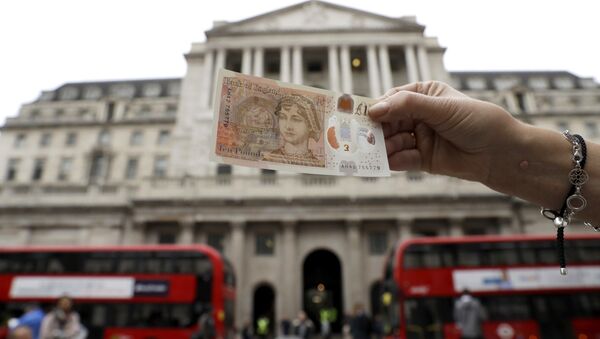The sterling hit a seven-week low on Monday after Boris Johnson announced preparedness to swap tariffs for regulatory freedom if Brussels attempts to impose its rules on post-Brexit Britain.
The pound fell by 1.95 cents to $1.3005, losing 1.5 percent against the dollar - the largest drop since 17 December, and 1.2 percent against the euro - down 1.4 cents to €1.1757.
According to Jordan Rochester, a foreign exchange strategist at Japanese holding company Nomura, cited by The Times, there could occur a further short-term fall in the pound due to “a renewed focus on Brexit and the level of long sterling positioning”.
The pound gained strength in December, topping $1.35, following Boris Johnson’s decisive victory in the snap vote, which lent confidence to businesses after several months of Brexit-related limbo. As the political uncertainty reached its climax in September, the sterling dropped to $1.20.
The recent dip coincided with Boris Johnson’s Monday speech, which media started to publicise well in advance.
In the address, which came ahead of upcoming post-Brexit trade talks with the European Union, the prime minister defended the free trade approach to economic ties between countries, lamenting recent intense attacks by hardline protectionists. However, Johnson made it clear that London would not blindly follow EU regulations under a future free trade agreement, but vowed commitment to "the highest standards" in terms of competition policy, social protection, subsidies, and fighting climate change.
Meanwhile, Brussels’ draft mandate for talks indicates that it wants the UK to abide by EU aid rules to ensure that the UK cannot game the system with subsidies or any financial injections.
Concerns have arisen in the former EU country about how exactly to approach the bloc’s jurisdiction, with Johnson reportedly even being prepared to okay tariffs to preserve the UK’s sovereignty in decision-making.
Media and analysts have been widely speculating on two options reported to be currently on the table regarding trade provisions - a “Canada-style” accord, which scrapped tariffs between Ottawa and the EU, and an Australia-like arrangement, which virtually means no free trade between the sides.
John Allan, 71, president of the CBI, warned that “talk of a bare bones deal could pause investment . . . The challenge is to ensure business confidence is not caught in the crossfire of a tough, public negotiation”.


